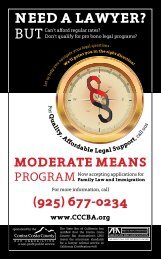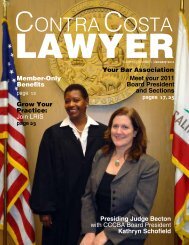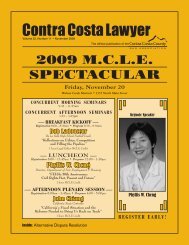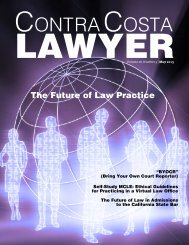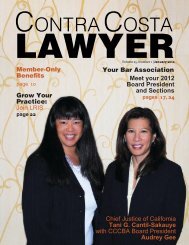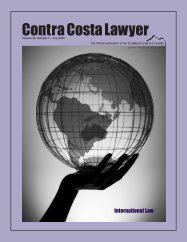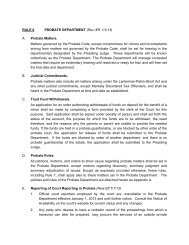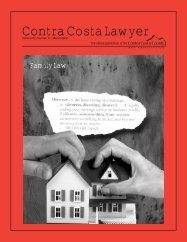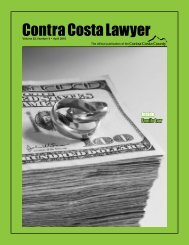Corporate/Business Law - Contra Costa County Bar Association
Corporate/Business Law - Contra Costa County Bar Association
Corporate/Business Law - Contra Costa County Bar Association
- No tags were found...
You also want an ePaper? Increase the reach of your titles
YUMPU automatically turns print PDFs into web optimized ePapers that Google loves.
<strong>Contra</strong> <strong>Costa</strong> <strong>Law</strong>yerVolume 22, Number 4 • April 2009The official publication of theB A R A S S O C I A T I O N<strong>Corporate</strong>/<strong>Business</strong> <strong>Law</strong>
LET INTELLIGENT INFORMATION FIND YOU.Work smarter, not harder, with these California resources from West:• Westlaw®• KeyCite®• Westlaw PeopleMap• ProDoc®• Legal Calendaring• West Case Notebook TM /West LiveNote TM• The Witkin Library• West LegalEdcenter®• Case Evaluator• CFLR® DissoMaster® Suite• Miller & Starr Library• California Pleadings,Motions & Memoranda• The Rutter GroupCalifornia PracticeGuides TMFor more information, call Karen Cornell, West <strong>Law</strong> Firm Consultant,at 510-530-6181 or email: karen.cornell@thomsonreuters.comWEST.THOMSON.COM© 2009 Thomson Reuters L-348196/3-09Thomson Reuters and the Kinesis logo are trademarks of Thomson Reuters.
inside2009 BOARD of DIRECTORSLarry Cook PresidentRon Mullin President-ElectKathy Schofield SecretaryAudrey Gee TreasurerRobin Pearson Ex OfficioChristopher BowenOliver BrayMike BrewerJay ChafetzVirginia GeorgePeter HassLeigh JohnsonKristen Thall PetersRon RivesDana SantosStephen SteinbergCandice StoddardCCCBA EXECUTIVE DIRECTORLisa Reep: 925.288-2555 • lgreep@cccba.orgCCCBA main office: 925.686-6900 • www.cccba.orgJennifer ComagesMembership CoordinatorEmily DaySystems Administrator andFee Arbitration CoordinatorManny GutierrezAdministrative Assistantand Legal InterviewerEDITORCandice Stoddard925.942-5100ASSOCIATE EDITORNancy J. Young925.229-2929BENCH LIAISONHon. Mary Ann O'Malley925.646-4001BOARD LIAISONCandice Stoddard925.942-5100COURT LIAISONKiri Torre925.957-5607ADVERTISING/DESIGNYoung Design & Production925.229-2929PRINTINGExcel Graphics925.552-9998<strong>Contra</strong> <strong>Costa</strong> <strong>Law</strong>yerPHOTOGRAPHERMoya Fotografx510.847-8523Maria NavarreteLRIS Coordinator<strong>Bar</strong>bara TillsonModerate Means ProgramCoordinatorMichele VastaSection Liaison / Education& Programs CoordinatorEDITORIAL BOARDKate Bekins925.284-0480Mark Ericsson925.930-6000Matthew P. GuichardLocal Civil Jury Verdicts925.459-8440Nicole Mills925.351-3171Craig Nevin925.930-6016Andrea L. O’Toole925.838-2090David Pearson925.287-0051Erika Portillo925.459-8440Andy Ross925.296-6000Kathy Schofield925.253-7890Audrey Smith, JFK Liaison925.969-3561Marlene Weinstein925.942-5100The <strong>Contra</strong> <strong>Costa</strong> <strong>Law</strong>yer (ISSN 1063-4444) is publishedmonthly by the <strong>Contra</strong> <strong>Costa</strong> <strong>County</strong> <strong>Bar</strong> <strong>Association</strong> (CCCBA),704 Main Street, Martinez, CA 94553. Annual subscription of $25is included in the membership dues. Second-class postage paidat Martinez, CA. POSTMASTER: send address change to the<strong>Contra</strong> <strong>Costa</strong> <strong>Law</strong>yer, 704 Main Street, Martinez, CA 94553.The <strong>Law</strong>yer welcomes and encourages articles and letters fromreaders. Please send them to Nancy J. Young, Associate Editor,<strong>Contra</strong> <strong>Costa</strong> <strong>Law</strong>yer, P.O. Box 1867, Benicia, CA 94510.The CCCBA reserves the right to edit articles and letterssent in for publication. All editorial material, including editorialcomment, appearing herein represents the views of the respectiveauthors and does not necessarily carry the endorsement ofthe CCCBA or the Board of Directors. Likewise, the publicationof any advertisement is not to be construed as an endorsementof the product or service offered unless it is specifically statedin the ad that there is such approval or endorsement.by David S. PearsonBernie Madoff, TARP, ‘Sir’ Allen Stanford, AIG, bank nationalization. It seems thatfor those who still read newspapers (there are still a few organizations left that haven’tfiled bankruptcy), all the news from the business section is going from bad to worse.So, just in time for some better business news, the April issue of the <strong>Contra</strong> <strong>Costa</strong> <strong>Law</strong>yeris themed around business issues, thanks to CCCBA’s <strong>Business</strong> <strong>Law</strong> and <strong>Corporate</strong>Counsel Section.After a very successful revival during 2006 and 2007, the section went dormant during2008. After gentle prodding from the bar, we are back, and our section board is comprisedof Larry Israel, Geoff Steele, Alan Ramos, Jonathan C. Watts and yours truly.We are looking forward to holding at least quarterly luncheons throughout the year.We started the year with a great program on unauthorized practice of law (UPL). Ouresteemed panel included Robert Hawley, the Deputy Executive Director for the State<strong>Bar</strong>, and Carol Langford (the <strong>Contra</strong> <strong>Costa</strong> <strong>Law</strong>yer’s ethics czar). The panel provided agreat overview for the attendees surrounding the issues that business attorneys haveto deal with every day when it comes to advising clients doing business in multiplestates. Robert Hawley was gracious enough to draft an article on UPL for those whowere unable to attend the luncheon.Jonathan Watts has authored an article on expense-sharing agreements for businesses.As the economy gets tougher, more small businesses are looking to reduce costs andoverhead. Since they aren’t eligible for TARP funds, sharing overhead sometimes lookslike an easy way to save money. He provides an overview for those advising their clientson the issues surrounding expense sharing, a popular option for many solo attorneysbut one fraught with peril, as any malpractice insurer will tell you.Finally, McNamara’s Roger J. Brothers and Ericka L. Ackeret provide an overview ofemployee competition and noncompetition agreements, while offering some greatadvice to businesses looking to protect themselves against employees competing unfairly.While California gives significant protections to employees who desire to compete withtheir former employers, the courts have not closed all the avenues to businesses seekingto protect themselves.We hope that you will join our section for lunch during the year. Since we are alwayslooking for great speakers and topics, feel free to email or call any of the section boardmembers with your ideas. u— David Pearson, a Walnut Creek solo, is the 2009 chair of CCCBA’s <strong>Business</strong> <strong>Law</strong> & <strong>Corporate</strong>Counsel Section. Since striking out on his own in 1996, he has concentrated his practice in the representationof closely held businesses and their owners. David can be reached at attorney@mac.com.4 April 2009
Res Ipsa Jokuitor XIVThe joke speaks for itself- Kickoff for Food From the <strong>Bar</strong> 2009 -Benefiting the Food Bank of <strong>Contra</strong> <strong>Costa</strong> and Solano CountiesDate Tuesday, April 28, 2009 • Tickets $60BBQ Buffet: 6:30 - 7:30pm • Show will begin about 8:00pmBack Forty Texas BBQ • 100 Coggins Drive, Pleasant Hill(Bring a can of beef stew to enter a drawing for some valuable prizes!)FeaturingWill Durst(OPENING ACT: Deb & Mike)Co-sponsored byFirst Republic Bank • Gilardi & Co. • The Recorder • Wells FargoCCCBA • Gagen, McCoy, McMahon, Koss, Markowitz & Raines<strong>Law</strong> Offices of Suzanne Boucher • Miller Starr Regalia • Morgan Miller BlairNevin, Ramos & Steele • Scott Valley Bank • Timken Johnson HwangFor tickets and additional information, call Lisa Reep at 925.288.2555Real Estate <strong>Law</strong>yerOver 25 years experience in the real property business!Commercial/ResidentialTitle Matters • Probate/TrustsDispute Resolution (International)<strong>Law</strong> Offices ofMagany Abbass3445 Golden Gate WayLafayette, CA 94549925.283-9088Arlene Segal<strong>Law</strong> Offices of Arlene SegalLitigation - MediationTrust and Estate Disputes • Financial Abuse100 Pringle Avenue, Suite 780 • Walnut Creek, CA 94596telephone (925) 937-4224 • fax (925) 937-4273note newAddress!<strong>Contra</strong> <strong>Costa</strong> <strong>Law</strong>yer 5
judicial profileHonorable Clare MaierClare Maier was born August 19, 1957in Van Nuys, California. In 1997, shereceived her BA in political science fromUCLA, where she was elected to Phi BetaKappa and graduated Summa cum Laude.She obtained her J.D. from UC BerkeleySchool of <strong>Law</strong> in 1990.POLITICAL AFFILIATION Democrat.PRE-BENCH LEGAL EXPERIENCE Just prior toappointment, Clare Maier was fortunateto work full-time as a Judge pro temporeat Juvenile Hall for approximately oneyear. For the six years prior to her workin Juvenile Hall, she served as a Judgepro tempore in seven different courts in<strong>Contra</strong> <strong>Costa</strong> <strong>County</strong>. Prior to her workas a Judge pro tempore, she worked as adependency (W&I §300) attorney and acriminal defense lawyer for both theAlternate Defender’s Office and thePublic Defender’s Office. Preceding that,she worked as a civil litigator in two differentlaw firms: Paul, Hastings, Janofsky& Walker and Cooley Godward, LLP (nowCooley Godward Kronish LLP).PRE-BENCH CIVIC AND PROFESSIONAL ACTIVITIESClare Maier previously served as an officeron the Board of an Organization in Oaklandnamed “Season for Non-Violence”working to reduce violence in Oakland.She also served in her Neighborhood CrimePrevention Council, and the East BayRegional Parks as a Park Trustee. In addition,she volunteered for the Oakland PoliceDepartment as an interviewer for the oralboards for police officer candidates.JUDICIAL EXPERIENCE As noted above, JudgeMaier served several years as a judicialofficer in juvenile court (both dependencyand delinquency), small claims and traffic.Her current assignment includes thedomestic violence calendar, misdemeanortrials and preliminary hearings. She hasalso had a rotation presiding over thearraignment calendar, unlawful detainers,and the limited civil calendar.CURRENT CIVIC AND PROFESSIONAL ACTIVITIESThe judge actively volunteers for the EastBay Regional Parks, and volunteers at theBerkeley Men’s Shelter. She currentlyserves as a mentor in the Judicial Mentoringprogram, and supervises summerinterns in the Richmond branch court.She is on the Criminal Committee, thesummer intern interviewing team, andshe works closely with court staff to hostschool groups that tour the court. Shehas also been a guest teacher at a LegalAdvocacy class at JFK University andvolunteered as a judge in Moot Courtcompetitions for both JFK University andthe high school moot court competitions.COURTROOM INFORMATION Department 36,100-37 th Street, Richmond 94805; phone:510.965-4136; fax: 965-4062. CourtReporter: Jan Pelletier; Clerk: Jackie Espy;Bailiff: Neal James.TYPICAL SCHEDULE Judge Maier is currentlyan “open” department, so she presidesover any trials, motions and preliminaryhearings assigned to her department.COURTROOM POLICIES Please check in withthe court clerk prior to your scheduledhearing. Also, such conventions as askingto approach the witness or to approachthe bench are appreciated and add to thedignity of the proceedings.TELECONFERENCING Judge Maier has heldconferences telephonically on civil matters.Please feel free to suggest this option inadvance of your hearing.6 April 2009
MOTIONS Please refer to and follow theCalifornia Rules of Court 301-339, theCode of Civil Procedure §2003 et seq., andthe local rules for filing motions. Alsoplease refer to the code for the format ofany substantive motions you may file(e.g. CCP §437c for Summary Judgmentmotions).DISCOVERY Attorneys are expected tofollow the Rules of Court and to makeevery effort to settle the dispute withoutcourt intervention. Only after such effortshould counsel file a motion to compel.The motion to compel should be concise,focused exclusively on the contestedissue(s).SETTLEMENT CONFERENCES The judge ishappy to discuss settlement with theparties at any juncture in a case. Sherequests that you come to the conferencewell prepared and accompanied by aperson with authority to settle.Immigration SpecialistCalifornia State <strong>Bar</strong> CertifiedP 925 . 349 . 9928 | F 925 . 349 . 9658www.roemerlaw.com | droemer@roemerlaw.com1390 Willow Pass Road, Suite 192 | Concord, CA 94520Specializing in <strong>Corporate</strong> immigration <strong>Law</strong> for over 15 yearsADR ADR is another useful tool for thecourt and attorneys. Judge Maier encouragesthe use of mediation and arbitrationwhenever appropriate.IN LIMINE MOTIONS The judge requests thatyou have these prepared in advance oftrial and clearly identify the portions oftestimony to which you are objecting andthe grounds for your objection.VOIR DIRE The court will conduct generalvoir dire. Counsel is permitted limitedquestioning. Judge Maier requests thatyou use your time resourcefully and donot merely repeat the questions the courthas already asked.JURY INSTRUCTIONS Please have instructionsprepared that include all applicable andmandatory jury instructions, not just thoseinstructions that might benefit your side. uSometimes it takes both knowledge and determination.Palmer Madden925.838-8593 • www.adrservices.comOver 25 years’ experience as an ADR neutralExperience without Administrative Fees<strong>Contra</strong> <strong>Costa</strong> <strong>Law</strong>yer 7
Mark V. MurphyPersonal InjuryReferrals RequestedOver 25 years experiencerepresenting injury victims.Practice dedicated solely toPersonal Injury.Each client given prompt,courteous attention.Antioch andSan Ramon Offices925.552.9900Glenn & Dawson LLPCertified Public AccountantsDonald A. Glenn CPA, ABV, CVA, CFELeslie O. Dawson CPA, ABV, CVASpecializing inLitigation Support – family law<strong>Business</strong> ValuationsProbate and EstatesFinancial InvestigationsAudit Tax and Accounting Servicesfor individuals andprivately owned companies.323 Lennon Lane, First FloorWalnut Creek, CA 94598Telephone (925) 945-7722Facsimile (925) 932-1491WITNESSES The judge would like witnessesto be informed of the court’s rulings onthe motions in limine and for them to bereminded as to the restrictions on theirtestimony.SANCTIONS While Judge Maier has not yetheld an attorney in contempt nor imposedsanctions, in the appropriate circumstances,she would take action consistentwith her authority to maintain securityand control in the courtroom that willfoster public respect for the bench andthe bar.DOCUMENTS/EXHIBITS The judge requests thatdocuments are pre-marked and previouslyreviewed by the opposing counsel priorto the inception of the hearing.DECORUM 1) Attorneys should wear businessattire when appearing in court. 2)Cell phones and pagers that could interruptthe proceedings should be turned offprior to the commencement of any hearing.3) The court realizes that counsel atthe table will communicate by note orwhispered message and realizes that suchcommunication may improve the qualityof the representation (two heads beingbetter than one). Counsel should be carefulto make this communication as discreteand as considerate as possible. The communicationshould not delay or disruptproceedings. 4) The court provides waterpitchers and cups for counsel and clients.Coffee or other beverage in a paper cupis allowed, so long as it does not distractfrom the dignity of the proceedings. 5)As noted above, please observe courtformalities, such as asking to approachthe witness or the bench.COURT REPORTERS Witnesses should beinformed that when they testify, they mustbe careful to only have one person speakingat a time, and wait for the questionto be completed prior to answering. Thisconsideration is important to enable thecourt reporter to keep a complete andaccurate record of the proceedings.TRANSLATORS: Interpreters should check inwith the court clerk in advance of thehearing.COMPUTERS IN THE COURTROOM Computersare welcome in Judge Maier’s courtroom,but please have the sound turned off.AUDIO-VISUAL All technology is welcome.Please produce (and/or demonstrate) theexhibit to opposing counsel and informthe court of your intent to use the audiovisualaid in advance of the hearing.CAMERAS IN THE COURTROOM The court maypermit or circumscribe the media coveragein a courtroom if doing so ensures thatthe fairness and dignity of the proceedingsare not adversely affected. [See CaliforniaRules of Court 1.150.]ADDITIONAL ADVICE Judge Maier believesthat all persons in a courtroom should betreated with dignity and given an opportunityto be heard. If you arrive on time,come prepared, and are forthright aboutthe law pertinent to the issues beingcontested, you will leave court satisfiedthat you have been heard. Your credi bilityis the most important asset you have.Credibility is very hard to build and easyto lose. If there is negative authority, pleasebring it to the court’s attention and explainwhy it is distinguishable to your factsituation. This is much preferred than thecourt finding the relevant authority andwondering if it was an oversight or anethical lapse. u— Judge Maier was interviewed by KendraJ. Jue of Shannon B. Jones <strong>Law</strong> Group.Did you know that the <strong>Contra</strong> <strong>Costa</strong><strong>County</strong> <strong>Bar</strong> <strong>Association</strong> website has40+ <strong>Contra</strong> <strong>Costa</strong> <strong>County</strong> SuperiorCourt judicial profiles so far? Go towww.cccba.org — “Member Resources toJudicial Profiles.”8 April 2009
Legal Solutionsfor the Busy Practice<strong>Contra</strong> <strong>Costa</strong> <strong>Law</strong>yer 9
TheUnauthorizedPractice of <strong>Law</strong>By Robert A. HawleyDefiniNG PRECiSELy the PRACTiCEof LAW has long been confounding.The definition is not codified in Californiastatute. It is expressed in Supreme Courtcase law as performing services before acourt or providing legal advice and preparinglegal instruments by which legalrights are secured, whether or not connectedto pending litigation. [See Birbrower,Montalbano, Condon & Frank, P.C., et al. v.Superior Court (1998) 17 Cal. 4 th 119,128-129 (hereafter “Birbrower”); Bluesteinv. State <strong>Bar</strong> (1974) 13 Cal. 3d 162, 173(hereafter, “Bluestein”).]Although appearing in court is readilyidentified as practicing law, precisely whenadvice and document preparation becomelegal practice can be elusive. As elusiveas it may be, when it becomes law practice,only licensed attorneys can do it. Althoughindividuals can represent their own interestsregardless of licensure, only an activemember of the State <strong>Bar</strong> can practice lawfor another [see Birbrower at 127]. Under<strong>Business</strong> and Professions Code (hereafter“Code”) §6125, it is a crime for an unlicensedperson to practice law. Further, no onemay seek compensation for legal servicesunless licensed at the time the serviceswere rendered [see Birbrower at 127].The State <strong>Bar</strong> acquires its jurisdictionover individuals through their licensedstatus. Thus, unlawful practice by thosetotally unlicensed is subject to prosecutionby local law enforcement agencies ratherthan by the State <strong>Bar</strong>. The State <strong>Bar</strong>coordinates with law enforcement toaddress violations, but cannot prosecutesuch offenses on its own. However, Californialawyers are subject to the disciplinaryauthority of the State <strong>Bar</strong>. It isa disciplinary offense for a licensed attorneyto practice law in an unauthorizedmanner. Rule 1-300, California Rules ofProfessional Conduct (hereafter “CRPC”),makes it a disciplinary offense for a Californiaattorney to practice law in Californiaor in another jurisdiction while notauthorized to do so. It also prohibitsassisting others who are unlicensed topractice law.Unauthorized practice by licensedattorneys occurs when one continues topractice while suspended or inactive.Suspension can occur as a disciplinarysanction or administrative action. Administrativesuspension or inactive enrollmentcan result from failure to pay annuallicensing fees [Code §6143]; failing tocomply with Minimum Continuing LegalEducation requirements [Code §6070(a)];failing to pay court-ordered child support[Code §6143.5]; or failing to comply witha mandatory and binding fee disputearbitration award [Code §6203(d)(1)].Unauthorized practice can also arise whenone practices outside the jurisdictionallimitations of the license, e.g., outsideCalifornia or before a tribunal where oneis not properly admitted.Attorneys face disciplinary liability forassisting one unlicensed to practice law,which can arise in a couple contexts. First,the Legislature has authorized paralegals,legal document assistants, unlawfuldetainer assistants, immigration consultantsand others to engage in limitedactivities associated with the practiceof law [see Code §§6400-16; 6450-56;22440-48]. It is important for theseparaprofessionals and the attorneys workingwith them to assure that they do notexceed the limits of their authority. Second,California attorneys working with lawyerslicensed in other states or countries (butnot licensed in California) need to assurethat they do not exceed the limits of their“foreign” license.The license to practice law is directedmore at the location where the practiceoccurs than at the actual law practiced. Inthe United States, the license to practice lawis granted by each state and is limited to thejurisdiction granting it. A California lawyeris not licensed in Nevada or any other stateunless admitted there. Nor can a Californialawyer practice before federal courts unlessproperly admitted by those courts. Oncelicensed, however, a practitioner is authorizedto advise on local, federal, or foreignlaw, subject to the requirements of competence[see Bluestein, at 173-174]. Butpracticing any law outside the jurisdictionalboundaries of the license may constitutethe unauthorized practice of law.10 April 2009
The seminal case on this subject is theNew York law firm, Birbrower. TheCalifornia Supreme Court found thatBirbrower improperly practiced law inCalifornia when the Birbrower lawyersprovided legal services to a Californiacorporation regarding a dispute in California,when they were not licensed in thisstate. The court also concluded thatBirbrower was not entitled to be compensatedfor the services rendered whileengaged in such unauthorized activities.The court found that the New Yorklawyers engaged in such sustained andongoing contacts with California that theypracticed law here. The primary focus wason the New York lawyers’ significantactivities in California and their continuingrelationship with a California clientthat encompassed legal duties and obligations.It was not necessary for the NewYork lawyers to physically be in California.The court concluded that one not licensedin California can be engaged in the unauthorizedpractice of law when advising aCalifornia client, regarding a Californiadispute while in California “virtually”through telephone, facsimile or e-mail[Birbrower, at 128-129].The Birbrower decision rocked the legalprofession nationally when it was renderedin 1998. It served as a catalyst to advancethe move toward regularizing multijurisdictionalpractice (MJP) standards acrossthe country. MJP is becoming commonplace.The jurisdictional borders that havehistorically governed the practice of laware eroding due to 21 st Century globalbusiness realities.Since Birbrower, California (like otherstates) has refined its MJP standards,allowing various forms of practice withinCalifornia on a “foreign” license. Theseinclude: pro hac vice admission in pendinglitigation [California Rules of Court (hereafter,“rule”), rule 9.40]; military counsel[rule 9.41]; Certified <strong>Law</strong> Students [rule9.42]; pro hac vice-like admission in pendingarbitrations [rule 9.43]; RegisteredForeign Legal Consultants who advisesolely on the law of their home jurisdiction[rule 9.44]; legal aid attorneys and inhousecorporate counsel who practice law uPutting your clients’ needs first.Customized Investment and Trust Servicesfrom Mechanics BankIRA HILLYERSENIOR VICE PRESIDENTINVESTMENT MANAGEMENT& TRUST SERVICESInvestmentManagementEffective Neutrals At Competitive Rates!Hon.AlfredChiantelli(Ret.)Hon.M.O.Sabraw(Ret.)Trust &Estate ServicesHon.RichardFlier(Ret.)Hon.DouglasSwager(Ret.)Dorene Kanoh, VP50 Fremont St., Ste. 2110San Francisco, CA 94105• Expert planning. Our integrated plans can combine the most up-to-dateknowledge in trust, estate, tax, custody and banking services.• Expert solutions. From building wealth and minimizing taxes toeffectively implementing wealth transfers and philanthropic wishes.• Expert service. We’re independent and locally owned with more than103 years of experience. And with the only trust department headquarteredin the East Bay, you have convenient access to all of our trust professionals.1333 N. California Boulevard, Suite 600Walnut Creek, CA 94596925.256.3033www.mechanicsbank.comPrivateBankingHon.StephenFoland, Comm.(Ret.)Hon.JamesTrembath(Ret.)FinancialPlanningMEC 2718 <strong>Contra</strong> <strong>Costa</strong> <strong>Law</strong>yer Mag 4.6875x4.5625_v5.indd 1Hon.RichardHodge(Ret.)MichaelCarbone,Esq.Hon.JoanneParrilli(Ret.)EricIvary,Esq.8/15/08 3:22:36 PMHon.BonnieSabraw(Ret.)MichaelMcCabe,Esq.tel 415.772.0900fax 415.772.0960www.adrservices.org<strong>Contra</strong> <strong>Costa</strong> <strong>Law</strong>yer 11
Roger F. Allen510.832-7770Ericksen, Arbuthnot, Kilduff,Day & Lindstrom, Inc.155 Grand Avenue, Suite 1050Oakland, CA 94612rallen@eakdl.comStandards • Strategies • Strength • SolutionsWELL PREPAREDto handle your complex business transactionsDoug Maggi, SVP925.944.0180 ext. 209Bob Kouba, VP925.944.0180 ext. 212Northern CaliforniaMediator / ArbitratorColleen Benatar, VP925.944.0180 ext. 21511 years as Mediator20 years as Arbitrator28 years in Civil Practice• Training includes Mediation Course atPepperdine University 1995• Serving on Kaiser Medical MalpracticeNeutral Arbitrators Panel• Settlement Commissioner, Alameda and<strong>Contra</strong> <strong>Costa</strong> Counties• Pro Tem Judge, Small Claims,Alameda <strong>County</strong>• Experienced in all areas of Tort Litigation,including injury, property damage, fire loss,malpractice, construction defectRick Wise, EVP925.944.0180 ext. 216California’s OldestIndependent Bankwww.scottvalleybank.comWALNUT CREEK 1500 N. California Blvd. • 925.944.0180Oakland , 1111 Broadway, 510.625.7850 • Santa Clara • 5201 Great America Pkwy., 408.653.1200Take advantage of one of the manyCCCBA membership benefits!To schedule an appointment witha CCCBA notary, please call<strong>Bar</strong>bara Tillson, (925) 370-2544704 Main Street • MartinezFree Notary Serviceson a “foreign” license if they meet certainstandards and register with the State <strong>Bar</strong>[rules 9.45, 9.46]; and out-of-state attorneysin California on a transitory basis topractice law related to clients and issuesvenued in their home jurisdiction [rules9.47, 9.48].Every state addresses unauthorizedpractice differently. The closest thing toa national standard is the American <strong>Bar</strong><strong>Association</strong> Model Rule of ProfessionalConduct 5.5. Like California’s standards,rule 5.5 allows a lawyer to practice lawin a state where s/he is not licensed whenpractice is limited to the in-house counselmodel, when pro hac vice standardsare met or when the activities in thestate are transitory and reasonablyrelated to the lawyer’s home jurisdiction.Retaining local counsel is also a solution,as long as that counsel supervises thelocal representation.The California attorney who leavesCalifornia to practice law elsewhere, evenon a transitory basis, needs to be aware ofthe MJP standards in the visited jurisdictionor risk unauthorized practice chargesunder that jurisdiction’s standards anddisciplinary liability under CRPC 1-300.In determining what is allowed, the followingare key elements (none of these aredeterminative, but each is a point of focusunder the law of the particular jurisdiction):the nature of the attorney’s admission; thelocation of the attorney when s/he practiceslaw; the home of the client; the locationof the client when s/he receives the legalservices; the venue of the legal dispute orissue. The more sustained and regular thecontacts with the geographic location, thegreater the need for licensure in that location.At least one California case suggeststhat the home of the client is of particularinterest. [See Estate of Condon (1998) 65Cal.App.4 th 1138.] u— Robert Hawley is the Deputy ExecutiveDirector of the State <strong>Bar</strong> of California and onthe adjunct faculty of the University of the PacificMcGeorge School of <strong>Law</strong>. The opinions expressedin this article are those of the author alone anddo not reflect those of the State <strong>Bar</strong> or of PacificMcGeorge.12 April 2009
LAW DAY FOR LAWYERS IV: How to Keep Your ProfitsUp When the Economy is Down . . .June 5, 2009JFK University School of <strong>Law</strong> – 100 Ellinwood Way, Pleasant HillProgram Moderator: Jay Chafetz, <strong>Law</strong> Office of Jay ChafetzEarn up to 6 MCLE Credits at this daylong series of lectures and roundtable discussions, which willfocus on running a profitable law practice, even during an economic downturn.8:00 – 8:30am Registration (coffee, tea &pastries included)8:30-9:30am Getting and KeepingClientsRick Norris, PrincipalArcher ▪ Norris9:40-10:40am Maximizing Profits, Part IGetting Paid – Andy RossWhiting, Fallon, Ross & AbelDealing with Potentially InsolventClients – David Katzen, Katzen &Schuricht10:50-11:50am Maximizing Profits, Part IIProfitability Levers andCalculations – Kristen StarkHildebrant & AssociatesNoon – 12:50pm Information TechnologyComputer Systems and OfficeEquipment – David Pearson<strong>Law</strong> Offices of David S. PearsonIncludes Boxed LunchConcurrent Seminars:1:00 – 1:50pm I. How to provide bigemployee benefits, even ifyou are a small firmVic Tanon, EmplicityII. Getting a loan/line of creditfrom a bank and otherbanking issuesRick WiseScott Valley Bank2:00 – 2:50pm III. When to hire your firstemployeeJay Chafetz<strong>Law</strong> Office of Jay ChafetzIV. <strong>Business</strong> plans & strategicplanning, even for the soloRichard FrankelFrankel & Goldware, LLPC O S T :All Day - Members: $75 / Non-members** $175Includes coffee, tea & pastries, lunch & up to 6 HoursMCLE Credit1-hour Sessions –Members: $15 / Non-members: $30Includes 1 hour MCLE Credit per sessionLunch Session –Members: $25 / Non-members: $50Includes 1 hour MCLE Credit and a boxed lunch**Non member attendees may apply the differencebetween the member and non-member rate towardsCCCBA membership.R E G I S T R A T I O N :Return via fax: 925/686-9867, or mail to: CCCBA,704 Main Street, Martinez, CA 94553 (See prices above)Name:Address:Phone:I/we would like to attend: All Day – or – Getting & Keeping Clients Maximizing Profits, Part I Maximizing Profits, Part II Lunch Session – Information TechnologyPlease select I or II: I. How to provide employee benefits . . . II. Getting a loan / line of credit from a bank . . .Please select III. or IV.: III. When to hire your first employee IV. <strong>Business</strong> plans & strategic planning . . .Payment: $ Check enclosed; Visa; MC; AMEX; Discovery #Exp. Date: SignatureFor further information, contact Lisa Reep at 925/288-2555.MCLE: The CCCBA CCCBA certifies certifies that that these activities activities have been approvedapproved for for MCLE Credit by by the the State <strong>Bar</strong> <strong>Bar</strong> of of California (Provider #393).#393).<strong>Contra</strong> <strong>Costa</strong> <strong>Law</strong>yer 13
Question manWhere does your discretionaryspending go these days?What discretionary spending? OnlyCongress gets to do that it seems.Jessica A. BravermanBraverman Mediation & ConsultingDiscretionary spending?I reject the premise.Joe LongLong BlumbergIt goes to national defense,police services, and a bunch ofwasteful programs. My incomeis distributed according tofederal and state governmentdiscretion, not mine.Kurtiss JacobsSolo, ConcordTo the extent possible, it goes to equipmentand research resources, whichreduce the cost of practice, are inexpensiveand provide quick cost recovery.John <strong>Bar</strong>nard<strong>Law</strong> Offices of John <strong>Bar</strong>nardNothing has changed as my typeof practice doesn’t ebb and flowwith the economy. The only differenceis that I am trying to buyAmerican. I’m looking at new carsand was surprised to find that theCadillac CTS V was better than the foreignsnob name competitors.Dan HorowitzSolo, LafayetteTo my wife, where it hasgone for the past 42 years.Julius KahnSolo, San RamonLas Vegas, Reno and Tahoe.Mitch Stevens<strong>Law</strong> Offices of Mitchell A. StevensIs discretionary spending asubset of income? Would I firsthave to have profit?Pieter Williams<strong>Law</strong> Offices of Pieter K. WilliamsFixing up our country place inMendocino <strong>County</strong>. I may bethe only one employing a contractorthese days.David A. Arietta<strong>Law</strong> Offices of David A. AriettaYokohama racing tires and Bray’s wine.Howard ThomasMediation & Legal ServicesOrder of priorities: 1) After-school sportsand music for the kids. 2) Going to moviesand book purchases. 3) Eating out. 4) Travel.5) Very little clothing and toy shopping.Sandy LowensteinSheldon & MankinToward past indiscretions.Paula Aiello<strong>Law</strong> Office of Paula AielloYou’re kidding . . . right?Bill UlrichSolo, AntiochAppealsCriminal & Civil<strong>Law</strong> Office of Ian R. Greensides2121 North California Blvd., Suite 290Walnut Creek, California 94596(925) 313-8703www.greensideslaw.com925.790-2600 • info@amllp.com • www.amllp.com14 April 2009
All discretionary spending isbeing used to pay down anyand all debt.Kenneth P. StrongmanMediation Offices of KennethP. StrongmanPersonally, discretionary spending has notreally changed. I still go to movies andout to dinner as much as possible, butspend a lot less. Instead of longer tripswhere I would miss a lot of work, I tendto take shorter, weekend-based vacationsthat would only have me out of the officefor a day or two. As for my law firm, ourmanaging partner and administrator tryto cut costs where the firm can, e.g., onsupplies, paper, copying, etc. as needed.Working with them, we also took a moreaggressive negotiating stance in renewingour subscription to online law databases,seeking to cut from our catalogue itemsthat attorneys simply were not using.Jerome C. PandellPandell <strong>Law</strong> Firm, Inc.My what?David L. RothReal Estate <strong>Law</strong> Offices of David L. Rothand Mediation CenterConservatorshipsMedi-Cal Planning / EligibilityEstate PlanningElder <strong>Law</strong>Ron MullinOne <strong>Corporate</strong> Centre p 1320 Willow Pass Road, Suite 420Concord, California 94520Telephone (925) 798-3413 p Facsimile (925) 798-3118Email ronald@mullinlaw.comThe <strong>Law</strong> Offices of David M. LedermanDive Monterey. Not only is the sceneryamazing, but there’s no recession talk!Elva D. HardingShapiro Buchman Provine LLPIn the past, discretionary income was primarilyused for various and sundry indiscretions.Now, however, as essential incomeis no longer available for essentials, (as it isbeing taken for support of all the governmentprograms, taxes and people who used essentialincome for indiscretions), I must hide mydiscretionary income and use it for essentials.I am, therefore, being very discrete abouttrying to forget about committing anyindiscretions because I am afraidthat will also be taxed with moneyfrom my essential income.Dan G. Ryan<strong>Law</strong> Office of Dan G. RyanDavid M. LedermanCertified Family <strong>Law</strong> SpecialistState <strong>Bar</strong> Board of Legal SpecializationTom SmithAssociate AttorneyPracticing exclusively in all aspects of Family <strong>Law</strong>in Walnut Creek and Antioch3432 Hillcrest Avenue • Suite 100 • Antioch, California 94531309 Lennon Lane • Suite 102 • Walnut Creek, California 94598Phone 925.522-8889 • Fax 925.522-8877www.ledermanlaw.net<strong>Contra</strong> <strong>Costa</strong> <strong>Law</strong>yer 15
Watch WhereYou Step!Common Pitfalls In Expense-Sharing Agreementsby Jonathan C. WattsFor many smaller businessesand professionals, expense-sharingcan be an attractive way to minimizeexpenses in tough times. After all, whowould not want to divide the rent, utilities,and administrative overhead by twoor even three?From a practical perspective, this canmake a lot of sense. Many of us haveclients who share expenses, and some ofus share expenses ourselves. But like awalk through a pasture, problems canarise if you do not watch your step.Leases and Premises LiabilitySharing office space will involve all of theexpense-sharing parties (“expense-sharers”)in a host of landlord-tenant issues, eventhose expense-sharers who think that theironly role is to write a check each month.Unless the lease agreement names all ofthe expense-sharers as tenants, one will betreated as a tenant and the others as subtenants.Most commercial leases restrictsubleasing without the landlord’s consent.Reviewing the lease and getting the landlord’sconsent is an obvious first step. Thesubtenants should also be aware that eventhough they pay their monthly rent to thetenant, they can be evicted if the tenantfails to pay the landlord. To prevent this,the subtenants may want to include safeguards,such as paying the landlord directlyor verifying the tenant’s payments.In all cases, each expense-sharer shouldconsider the usual issues, such as the termof the lease, utilities, maintenance, parking,and tenant improvements. And as anyonewho has shared a student apartment knows,the expense-sharers will also encounter awhole range of seemingly mundane issuesthat can spark severe disagreements. Theseinclude dividing up the space, sharing thecommon areas, scheduling use of theconference room, cleaning the office, cleaningthe refrigerator, keeping a tidy workarea, and decorating.Finally, as co-possessors of the premises,the expense-sharers will likely also sharein the resulting premises liability. Thisneeds to be addressed in their respectiveinsurance policies.Unintended PartnershipsBy definition, a true expense-sharingrelationship is just that: an agreement toshare expenses. But if the expense-sharersfail to segregate their individual businesses,they could end up with much morethan they bargained for.The Uniform Partnership Act of 1994provides that “the association of two ormore persons to carry on as co-owners abusiness for profit forms a partnership,whether or not the persons intend to forma partnership” [Corp. Code, §16202].Like a Las Vegas wedding, an accidentalpartnership comes with unintendedconsequences. For example, the expensesharers,whether they know it or not,will be saddled with fiduciary duties ofloyalty and care to each other and totheir new partnership [Corp. Code,§16404]. Each expense-sharer will alsobe jointly and severally liable for all ofthe other expense-sharers’ businessrelatedliabilities [Corp. Code, §16306].Furthermore, there may also be importanttax consequences.LAW OFFICES OFDOUGLAS A. PRUTTONRepresenting employees only in all types oflabor and employment matters, includingwrongful termination and overtime claims.Free consultation, contingency fees,costs advanced, 26 years experience.1866 Clayton Road • Suite 211 • Concord(925) 677-5080pruttonlaw@earthlink.netYoung Design&ProductionD E S I G NW R I T I N GE D I T I N GYoung Design & Productionis the designer for the <strong>Contra</strong><strong>Costa</strong> <strong>County</strong> <strong>Bar</strong> <strong>Association</strong>Specializing inlaw firm brochuresand newslettersNancy YoungOwnerP.O. Box 1867 Benicia, CA 94510(925) 229-2929 or (707) 747-5775email: young-design@prodigy.net16 April 2009
To avoid an unintended partnership,the expense-sharers should only shareexpenses and overhead; nothing else. It isessential that they keep their businessesseparate, both in their day-to-day activitiesand in their communications with clientsand other third parties. For example, eachexpense-sharer should have his or her ownbank account, business license, telephoneline, fax line, website, letterhead, andcomputer server or internet connection.If the expense-sharers also share a receptionist,s/he should answer each line withthe name of the applicable expense-sharer:i.e., “XYZ Accounting” and not “accountingand law office.” They should alsocollect their own receivables, pay theirown bills, and file their own tax returns.Above all, expense-sharers should notshare profits with each other. In additionto creating an unintended partnership, thiscould (in the case of attorneys) violate theRules of Professional Conduct relating tothe division of legal fees with non-lawyers[rule 1-320] and the division of fees withindependent attorneys [rule 2-200].Confidential InformationMany businesses and professions have aduty to prevent the disclosure of confidentialclient information to unauthorizedthird parties. For example, an attorney isrequired “To maintain inviolate the confidence,and at every peril to himself orherself to preserve the secrets, of his orher client” [Bus. & Prof. Code, §6068(e)].Other obvious examples include financialplanners, accountants, and healthcareproviders. And in today’s environment,nearly anyone who accepts credit card paymentshas at least some confiden tialityobligations.Ideally, expense-sharers will like andtrust each other. But it is essential toremember that each fellow expense-sharer— no matter how trustworthy — is an“unauthorized third party” who shouldnot have access to clients’ confidentialinformation. Each expense-sharer shouldstore his or her clients’ confidential infor- uBennett, Samuelsen, Reynolds & AllardA Professional CorporationElder <strong>Law</strong> isAlzheimer’sPlanningis pleased to announce thatSTUART C. GILLIAMhas joined the firm as a shareholderMr. Gilliam brings over twenty years of professional andpractical experience in general defense litigation and mediation, includingconstruction, personal injury, land movement, real estate and coverage analysis.Bennett, Samuelsen, Reynolds & Allard is anAV-rated professional law corporation, founded in 1979.The firm specializes in handling all types ofdefense litigation matters in state and federal courts.1301 Marina Village Parkway, Suite 300 • Alameda, CA 94501510-444-7688 • www.lawyers.com/bsraThe average survival rate is eight years after beingdiagnosed with Alzheimer’s — some live as few asthree years after diagnosis, while others live as longas 20. Most people with Alzheimer’s don’t die fromthe disease itself, but from pneumonia, a urinarytract infection or complications from a fall.Until there’s a cure, people with the disease willneed caregiving and legal advice. According to theAlzheimer’s <strong>Association</strong>, approximately one in tenfamilies has a relative with this disease. Of thefour million people living in the U.S. withAlzheimer’s disease, the majority live at home —often receiving care from family members.If the diagnosis is Alzheimer’s,call elder law attorneyMichael J. YoungEstate Planning, Disability, Medi-Cal,Long-term Care & VA PlanningProtect your loved ones, home and independence.n925.256.0298www.YoungElder<strong>Law</strong>.com1931 San Miguel Drive, Suite 220Walnut Creek, California 94596<strong>Contra</strong> <strong>Costa</strong> <strong>Law</strong>yer 17
mation in a secure location, such as alocked file cabinet, where the otherexpense-sharer(s) cannot access it.Maintaining client confidentialitybecomes more difficult if the expensesharersshare a clerical employee. Theexpense-sharers would likely be treatedas co-employers of this individual (asdiscussed below). If the clerical employeehas access to confidential client information,the expense-sharers could inadvertentlyviolate their duty to keep theirclients’ confidential information confi dentialfrom each other.There does not appear to be a one-sizefits-allsolution to this problem. In manycases, it may be appropriate to have theclerical employee sign a confidentiality agreementunder which s/he agrees not to shareeach expense-sharer’s confidential clientinformation with the others. Much willdepend upon the particular rules and regulationsthat apply to each expense-sharer.EmploymentIn many expense-sharing agreements, oneexpense-sharer pays the employee’s wagesand fulfills the tax withholding, workers’compensation and related obligations thatapply to employers. The others simplyreimburse their share of the cost, utilizethe employee’s services as agreed, andcongratulate themselves on avoiding theheadache.What often passes unnoticed is thatall of the expense-sharers may be coemployersunder the law. In spite of theproverb that no one can serve two masters,if an employee is subject to the supervisionand control of more than one expensesharer,all of the supervising expensesharersmay be treated as co-employers,even if the employee is only on the payrollof one.The implications are far-reaching. Ifthe employee works more than 8 hoursin a day or 40 hours in a week, forexample, and does not receive overtime,all of the co-employers may be liable. Thiscan also be true if any one of the coemployerssexually harasses the employee.Finally, all of the co-employers could faceliability under a respondeat superior theoryfor the employee’s actions in the courseand scope of employment.If the expense-sharers intend to sharean employee, it would probably be advisableto enter into a written agreementdefining their duties. The expense-sharerwho has the receptionist on his or herpayroll should agree to abide by all applicableemployment laws, including wageand hour, tax withholding, and workers’compensation. The agreement shouldaddress the other expense-sharers’ paymentobligations and, if appropriate, theconfidentiality issues discussed above.Finally, the employee and the expensesharerswill need to have a clear understandingabout “who is the boss” forpurposes of hiring, firing, schedulingvacation, and the like.RecommendationsThere is no way to completely eliminatethe risks that come with any businessrelationship, and expense-sharing is noexception. But once the risks are identified,they can be easier to control.The first step in any new expensesharingrelationship is to identify theimportant “deal points” in the relationshipand come to a written agreement on them,such as a sublease and an employeesharingagreement. This process can helpto resolve the major details of the relationshipat the outset, when everyone is ongood terms, rather than wait for a crisis.Each expense-sharer should also reviewthe details of the expense-sharing relationshipwith a qualified insurance agent. Itis important to obtain appropriate coverage,and an off-the-shelf policy may notfit the bill. u— Jonathan Watts is anassociate at San Ramon’sFrankel & Goldware, LLP.His practice emphasizes corporatelaw and general businesstransactions for closely-heldbusinesses.— Wanted —ConservatorshipsthinkMatt Tothas inPedder, Hesseltine,Walker & Toth, LLPoldest partnership in <strong>Contra</strong> <strong>Costa</strong> <strong>County</strong>(52 years)p 925.283-6816 • f 925.283-36833445 Golden Gate Way, P.O. Box 479Lafayette, CA 94549-0479av Martindale-HubbellJulie SchumerCertified Appellate SpecialistCertified by the State <strong>Bar</strong> of California Board of Legal SpecializationMotions, Appeals & Writs30 years experience925.254.3650juliesch@ix.netcom.com • www.bayareaappellatelawyer.com18 April 2009
ethics cornerby Carol M. LangfordI received a letter from a group of <strong>Contra</strong><strong>Costa</strong> lawyers seeking advice on a feematter. I have chosen it for this columnas it raises an important ethics issue inthese financially troubled times.Dear Ethics <strong>Law</strong>yer:I am taking you up on your invitation inthe <strong>Contra</strong> <strong>Costa</strong> <strong>Law</strong>yer to pose an ethicsquestion for your input. Please tell us what todo about the following. A client gave us twochecks for fees. One is post-dated and one isblank, but the client signed the blank check.The client was supposed to tell us how much toput in the amount section of the blank check(i.e. how much she could afford to pay). Wedealt with the post-dated check fine; it hascleared the bank. We still have the blank one,and she has not authorized us to fill in anamount.We are owed lots of money at this point forour work and the now former client hasn’t paida single bill sent to her. Can we fill in theamount due us on the blank check, or at leasta portion of it, and take it to the bank? Wecould sure use the money.Signed,“Show us the money”RichmondPlease send your ethics questions to:Carol Langford100 Pringle Avenue, Suite 570Walnut Creek CA 94596langford@usfca.eduvoicemail: 925-938-3870Dear Richmond <strong>Law</strong>yers:I feel for you — there is nothing worsethan a client who agreed to pay for workand who later just won’t pay for it. I think,however, that cashing the blank checkwill do nothing but buy you a whole heapof trouble. That is because the check wasonly supposed to be filled in for an agreedamount, and none was actually agreedupon. Yes, she signed a fee agreement (Iassume…I sincerely hope?) but she hasnot yet given assent to a figure to put inthe blank check. That is because she is infinancial trouble. On a practical note, itdoes no good to negotiate the blank checkif there is not enough money in heraccount, so the check bounces.When I asked colleagues about yourissue to gauge their reactions, I gotresponses back like this: “Looks bad, smellsbad. I would not touch it with a disinfected10-foot pole.” And another: “I think theonly proper amount to fill in the blankcheck is for a zillion bucks — the amountthe attorneys will need to cover the costof malpractice defense counsel.” And last,but certainly not least: “I would send thecheck to Congress and let them fill it out,but then they would need to loan the bankmoney to pay the check!”In short, I could not find a single bit ofsupport for filling out the blank check. Iagree with my learned colleagues. I believethat the current State <strong>Bar</strong> Court woulddiscipline a lawyer for filling in and cashingthe check. You should know that the State<strong>Bar</strong> Court is far harsher than they haveever been, even for minor infractions. Thiswould not be seen as minor, and would putyou in State <strong>Bar</strong> Court hell.However, all is not lost. There is feearbitration available through the CCCBA.If you feel they can’t get you a fair hearing,however, you can call the State <strong>Bar</strong> to conductthe arbitration. Fee arbitration is thebest thing since sliced bread, and it is cheap.No witnesses to put on, and no recovery bya client for legal malpractice unless thelawyers completely failed to do somethingvitally important, and even then it is calledan offset for lack of value of services and notmalpractice. (Check with the <strong>Contra</strong> <strong>Costa</strong><strong>County</strong> <strong>Bar</strong> <strong>Association</strong> for rules on this.) So,no cross-complaint for legal malpractice— one of the big fears of lawyers who suefor money owed. And, no letter from yourmalpractice carrier saying they don’t coverlegal malpractice claims that arise from feedisputes. You can even ask for the filing feefrom the client if she loses.Fee arbitration was designed to makefee disputes more easily and efficientlyresolved. Know that even though bothparties have to agree to make the decisionbinding, in around 95% of the cases beforethe State <strong>Bar</strong> it becomes binding aspeople just decide they got a fair hearingand don’t want to spend any more timeor money. It really works.Good luck, Richmond lawyers. Thebottom line: In these troubled times, it isalways best to get the money upfront.You have to figure that what you getupfront may be all you ever get. u— Carol M. Langford specializes in providingadvice and representation in ethics and State <strong>Bar</strong>matters. She is an adjunct professor of law at U.C.Hastings School of <strong>Law</strong> and a former Chair ofthe California State <strong>Bar</strong> ethics committee.<strong>Contra</strong> <strong>Costa</strong> <strong>Law</strong>yer 19
Limiting the Adverse Effects ofEmployee Competition Following California’sInvalidation of Noncompetition Agreementsby Roger J. Brothersand Ericka L. AckeretWhEN CONSiDERiNG the iSSueof how to prevent former employees fromcompeting with an employer, the averageemployer seeks to draft an agreementthat simultaneously prohibits formeremployees from: 1) working for theemployer’s competitors; 2) soliciting theemployer’s clients and employees; and3) divulging the employer’s trade secretsand other confidential information.However, as has become apparent toCalifornia employers, not only would suchan agreement not be enforced in California,but the employer may also be subjectto liability for the attempted enforcementof such an agreement. On August 7,2008, the California Supreme Court (the“Court”) issued its seemingly sweepingopinion in Edwards v. Arthur AndersenLLP, 44 Cal. 4th 937 (Cal. 2008), whichconsidered and reviewed the state ofnoncompetition agreements in California.Although the Court did not tackle theenforceability of all of the employer’sobjectives enumerated above, the Courtwas unambiguous in its holding: Unlessa specific statutory exception exists,noncompetition agreements that restraincompetition in any way are strictly un -enforceable. In the wake of the Court’sholding in Edwards, California employershave been left to wonder what they cando in order to limit the adverse effects ofemployee competition. Thankfully, forthe average California employer, not allhope is lost.Pre-EdwardsPrior to the Edwards decision, Californiastate courts had routinely found noncompeteand nonsolicitation clauses tobe unenforceable. Section 16600 of theCalifornia <strong>Business</strong> and Professions Code,which was enacted in 1872, provides that,“Except as provided in this chapter, everycontract by which anyone is restrained fromengaging in a lawful profession, trade, orbusiness of any kind is to that extent void.”California state courts had consistentlyinterpreted section 16600 as promotingthe ideals of a free market with opencompetition and employee mobility.However, unlike California state courts,California federal courts had adopted thelimited or “narrow-restraint” test thatstates that noncompetition agreementswhich only narrowly restrain competitionare enforceable. [See Campbell v. Trustees ofLeland Stanford Jr. Univ., 817 F.2d 499(9th Cir. 1987); General Commercial Packagingv. TPS Package, 123 F.3d 1131 (9thCir. 1997).]The Edwards DecisionIn Edwards, the Court considered thevalidity of a noncompetition agreement,which defendant Arthur Andersen requiredplaintiff Raymond Edwards II, a CPA, tosign upon employment. The subject noncompetitionagreement prohibited Edwardsfrom: 1) providing accounting services tothe clients with whom he worked whileat Arthur Andersen; 2) soliciting ArthurAndersen clients; and 3) hiring away anyArthur Andersen employees, for periodsranging from one year to 18 months followingtermination of his employmentrelationship.The Court held that enforcing thenoncompetition agreement was unlawfulunder §16600 because by restrictingEdwards from performing accountingservices for Arthur Andersen’s clients,Arthur Andersen was restricting Edwards’ability to engage in a lawful profession.The Court also held that the enforcementof the agreement was a wrongful act thatcould lead to liability on the part of ArthurAndersen for interference with Edwards’prospective economic advantage. TheCourt stated unequivocally, “Section 16600prohibits employee noncompetition agreementsunless the agreement falls within a statutoryexception” [44 Cal. 4th at 942)]. Such20 April 2009
statutory exceptions, contained in the<strong>Business</strong> and Professions Code, include theenforceability of noncompetition agreementsin the sale of a business (§16601),dissolution of a partnership (§16602) orin the termination of a member’s interestin a limited liability company (§16602.5).The Court held not only that the noncompeteclause was void under §16600,but also specifically rejected the NinthCircuit’s line of cases, which had establishedand upheld noncompetition agreementsthat were limited in nature ornarrowly tailored. Finally, although theCourt did not specifically address theenforceability of the clause by whichEdwards was prohibited from solicitingany Arthur Andersen employees, theCourt’s invalidation of the agreement asa whole presumably upheld the line ofcases decided by California state courts,which had previously held that thesolicitation of former co-workers waspermissible.Limiting the Adverse Effectsof Employee CompetitionEven though Edwards confirms that noncompeteand nonsolicitation clauses areunenforceable as to former employeesunder California law, California employersare not without options.Trade SecretsAlthough not codified in the <strong>Business</strong> andProfessions Code, there has long existed a“trade secret” exception to the unenforceabilityof noncompetition agreements,whereby employers may enforce agreementsunder which an employee agreesnot to use an employer’s trade secrets aftertermination of his/her employment. TheEdwards Court chose not to address thisissue in its opinion. In a footnote, the Courtobserved that, “We do not here address theapplicability of the so-called trade secret exceptionto section 16600 as Edwards does not disputethat portion of his agreement or contend that theprovision of the non-compete agreement prohibitinghim from recruiting Andersen’s employeesviolated section 16600” [44 Cal. 4th at 946n. 4]. As such, for the time being, the “tradesecret” exception remains in force.The “trade secret” exception appliesonly to “trade secrets,” as specificallydefined in the Uniform Trade Secrets Act.As such, not all confidential informationis protected by the “trade secret” exception.In order to protect its trade secrets,employers should draft nondisclosure andnonsolicitation clauses that are narrowlytailored and clearly evince the intentionto protect their trade secrets in order tomaintain compliance with §16600.Deterrence from Leaving EmPLoymentIn order to deter employees from not onlyleaving and competing with its companybut also from soliciting its clients andother employees, an employer may considerincluding disincentives to leavingthe employer in an employment agreement.For example, California courts haveupheld agreements that require the reimbursementof certain training and relocationcosts that the employer paid in caseswhere the employee leaves the companyprior to a certain length of time, such asone or even five years.RecoUPment of Wages aLready EarnedIs an employer completely without remedyshould it discover that a former employee,who is now competing with the employer,commenced his/her competing activitieswhile employed by the employer? Theanswer to that question is a resounding“No.”The “faithless servant doctrine” providesthat an employer may recoup wagesand benefits earned by a disloyal employee.Under the tenants of the employeremployeerelationship, an employee owesundivided loyalty to his current employer.In Service Employees International Union,Local 250 v. Colcord, 160 Cal.App.4th 362(2008), California’s First District Courtof Appeal allowed an employer to recoversalary and benefits that the employer hadpaid to an employee who breached hisfiduciary duties by secretly competingwith his employer.Although the “faithless servant doctrine”has long been recognized inCalifornia state courts, Colcord is thefirst case in which a court clarifies thatemployers are permitted to recoup wagesfrom employees for faithfully completedwork, as well as for work completedduring periods of disloyalty. The Colcordcourt clarifies that disloyal employeesmust forfeit all compensation receivedfrom the employer after the first momentof disloyalty.As evidenced by Colcord, if an employeeoperates a competing business or makesarrangements to work for his employer’scompetitor while employed, such conductis considered disloyal. Colcord makes itclear that the employer may recoup wagespaid to an employee if the employee beganhis/her disloyalty while still employed bythe employer.ConclusionAlthough Edwards significantly limits aCalifornia employer’s options in protectingitself from former employee competition,California employers have the option ofdrafting nondisclosure and nonsolicitationclauses that are narrowly tailored to protecttrade secrets and drafting employmentagreements that provide for the reimbursementof the employer’s costs following theearly resignation of an employee. Finally,if an employer has a disloyal employee,California law provides for the recovery ofwages and salary paid to such disloyalemployees. Nevertheless, in light of theliability that Edwards places on employersfor the attempted enforcement of noncompetitionagreements, California employersshould arrange promptly for a review ofall employee manuals, existing employmentagreements, confidentiality agreementsand employment policies, andrelated forms and documents to ensurethat all such documents are in accordancewith §16600. u— Roger J. Brothers is a partner in the lawfirm of McNamara, Dodge, Ney, Beatty,Slattery, Pfalzer, Borges & Brothers LLP. Hispractice focuses on transactional and litigationmatters involving general business, real estateand construction. Ericka L. Ackeret, also of theMcNamara firm, works in the <strong>Business</strong>Services Group, where she focuses on transactionalmatters involving general business.<strong>Contra</strong> <strong>Costa</strong> <strong>Law</strong>yer 21
advertisers’ indexADR Services, Inc.. . . . . . . . . . . . . . . . . .11Roger F. Allen . . . . . . . . . . . . . . . . . . . . .12Armanino McKenna LLP . . . . . . . . . . . . .14<strong>Bar</strong>r & <strong>Bar</strong>r Attorneys. . . . . . . . . . . . . . . .23Bennett, Samuelsen, Reynolds & Allard. . .17Diablo Valley Reporting Services . . . . . . .24Glenn & Dawson LLP. . . . . . . . . . . . . . . . .8JAMS . . . . . . . . . . . . . . . . . . . . . . . . . . . .9<strong>Law</strong> Office of Daniel Roemer . . . . . . . . . . .7<strong>Law</strong> Office of Ian R. Greensides . . . . . . . .14<strong>Law</strong> Offices of Arlene Segal . . . . . . . . . . . .5<strong>Law</strong> Offices of David M. Lederman . . . . . .15<strong>Law</strong> Offices of Douglas A. Prutton . . . . . .16<strong>Law</strong> Offices of Magany Abbass. . . . . . . . . .5Mechanics Bank . . . . . . . . . . . . . . . . . . .11Mullin <strong>Law</strong> Firm . . . . . . . . . . . . . . . . . . .15Mark V. Murphy . . . . . . . . . . . . . . . . . . . . .8One Hour Legal Services . . . . . . . . . . . . . .9Palmer Madden ADR Services . . . . . . . . . .7Pedder, Hesseltine, Walker & Toth, LLP. . 18, 22Julie Schumer. . . . . . . . . . . . . . . . . . . . .18Scott Valley Bank. . . . . . . . . . . . . . . . . . .12Westlaw . . . . . . . . . . . . . . . . . . . . . . . . . .2Young Design & Production. . . . . . . . . . .16Michael J. Young. . . . . . . . . . . . . . . . . . .17Youngman, Ericsson & Low, LLP . . . . . . .22Zandonella Reporting Service . . . . . . . . .23officesfor rent...contractattorneys...jobopportunities...classifiedsPrime Space in Walnut CreekSpace available in separated portion oflaw office in prime Class A building indowntown Walnut Creek. Range of officesizes, some with amazing view of Mt.Diablo. Rents ranging from $800 to$1,750 per month. Secretarial stationsavailable for additional rent. Reception,law library, conference rooms, parkingincluded. Call 925.979-3330.Walnut Creek Window OfficeLease a fully furnished window officew/sec station and tons of amenities. On-siteconf rooms, receptionist service, law library,telephone system, voice mail, notary (onsite),copy machines, postage machines,and mail-handling. Professional Class Abldg. w/plenty of parking, great location,and easy access to freeway and BART. CallKristie, 925.947-0100, x224.Lafayette Transit Village Office SpaceOffice in business law firm next to BARTin Lafayette (27 min. to Montgomery StreetBART station). Receptionist, conf. room,parking, ground floor, only one block frompost office and Lafayette’s restaurant row.Call Jim or Michelle at 925.284-4447.961 Ygnacio Valley Road, Walnut CreekShare building with 7 solos. One officeavailable. All amenities. 925.938-2460.Walnut Creek shadelands area$795/month. Window office (approx.154sf) and sec space (approx 64sf) in quietsetting off walking trail in the Shadelands(end of Lennon Lane, off Ygnacio). Singlestory bldg. Shared kitchen, receptionist,conf rooms and library included. Pleasecontact Christine, 925.256-9855, x13.Walnut Creek Office SpaceTreat Blvd near BART. Conf room, fax,copier, good freeway access. Parking.$495/month. Call 925.939-2544.professional announcementsProbate paralegal to attorneysJoanne C. McCarthy. 2204 Concord Blvd.Concord, CA 94520. Call 925.689-9244.Private InvestigatorBob Bailie Investigations can help tofind that witness and confirm facts. Over30 years of experience. Call 925.934-4904or email bailiepi@aol.com for a seasonedprofessional. Lic. #2328. Get it done right!To place a display or classified ad, please callYoung Design & Production (925.229-2929).Display ads start as low as $80 per month;classifieds run as little as $36 per ad.Youngman, Ericsson & Low, LLP1981 North Broadway • Suite 300Walnut Creek, CA 94596Tax <strong>Law</strong>yers.(925) 930-600022 April 2009
Will & Trust LitigationElder Abuse Litigation • ConservatorshipsB A R R & B A R RA T T O R N E Y S101 Gregory Lane, Suite 42 • Pleasant Hill, CA 94523-4915 • (925) 689-9944Edward E. <strong>Bar</strong>rChristopher M. MooreLoren L. <strong>Bar</strong>r*John Milgate, Of CounselJoseph M. MorrillTracey McDonald, Paralegal*Certified Specialist, Estate Planning, Trust and Probate <strong>Law</strong>, The State <strong>Bar</strong> of California Board of Legal Specialization<strong>Contra</strong> <strong>Costa</strong> <strong>Law</strong>yer 23



